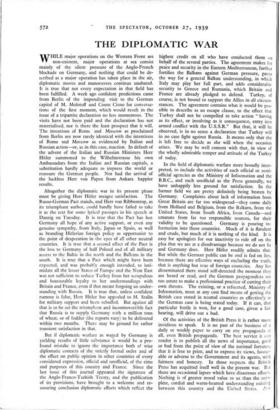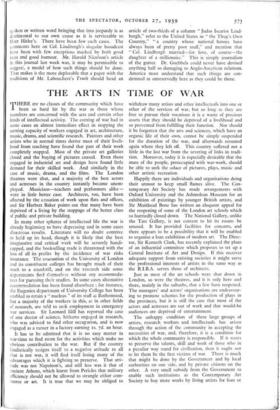THE DIPLOMATIC WAR
WHILE major operations on the Western Front are non-existent, major operations at sea consist mainly of the silent pressure of the Anglo-French blockade on Germany, and nothing that could be de- scribed as a major operation has taken place in the air, diplomatic moves and manoeuvres continue unabated. It is true that not every expectation in that field has been fulfilled. A week ago confident predictions came from Berlin of the impending visit to the German capital of M. Molotoff and Count Ciano for conversa- tions of the first moment, which would result in the issue of a tripartite declaration no less momentous. The visits have not been paid and the declaration has not materialised, nor is there the least prospect that it will. The intentions of Rome and Moscow as proclaimed from Berlin are now rarely identical with the intentions of Rome and Moscow as evidenced by Italian and Russian action—or, as in this case, inaction. In default of the advent of the Italian and Russian Ministers Herr Hitler summoned to the Wilhelmstrasse his own Ambassadors from the Italian and Russian capitals, a substitution hardly adequate to impress the world or reassure the German people. Nor had the arrival of the luckless Herr von Papen from Ankara happier results.
Altogether the diplomatic war in its present phase must be giving Herr Hitler meagre satisfaction. The Russo-German Pact stands, and Herr von Ribbentrop, as its triumphant author, could hardly have failed to take it as the text for some lyrical passages in his speech at Danzig on Tuesday. It is true that the Pact has lost Germany all hope of any active support, or even any genuine sympathy, from Italy, Japan or Spain, as well as branding Hitlerian foreign policy as opportunist to the point of desperation in the eyes of all other neutral countries. It is true that a second effect of the Pact is the loss to Germany of half Poland and of all military access to the Baltic in the north and the Balkans in the south. It is true that a Pact which might have been expected, and was probably enough intended, to inti- midate all the lesser States of Europe and the Near East was not sufficient to seduce Turkey from her scrupulous and honourable loyalty to her understandings with Britain and France, even if that meant forgoing an under-. standing with Russia. It is true that, unless confident rumour is false, Herr Hitler has appealed to M. Stalin for military support and been rebuffed. But against all that is to be set the triumphant and incontrovertible fact that Russia is to supply Germany with a million tons of wheat, or of fodder (the reports vary) to be delivered within two months. There may be ground for rather transient satisfaction in that.
But if diplomatic warfare as waged by Germany is yielding results of little substance it would be a pro- found mistake to ignore the importance both of wise diplomatic contacts of the strictly formal order and of the effect on public opinion in other countries of every considered expression, official and unofficial, of the aims and purposes of this country and France. Since the last issue of this journal appeared the signature of the Anglo-Franco-Turkish Treaty, and the publication of its provisions, have brought to a welcome and re- assuring conclusion diplomatic efforts which reflect the highest credit on all who have conducted them on behalf of the several parties. The agreement makes for peace and security in the Eastern Mediterranean, further fortifies the Balkans against German pressure, paves the way for a general Balkan understanding, in which Italy may play her full part, and adds considerable security to Greece and Rumania, which Britain and France are already pledged to defend. Turkey, of course, is not bound to support the Allies in all circum- stances. The agreement contains what it would be pos- sible to describe as an escape clause, to the effect that Turkey shall not be compelled to take action " having as its effect, or involving as it consequence, entry into armed conflict with the U.S.S.R." But that, it will be observed, is in no sense a declaration that Turkey will in no case fight against Russia. It means only that she is left free to decide as she will when the occasion arises. We may be well content with that, in view of the wholly admirable temper and attitude of the Turkey of today.
In the field of diplomatic warfare more broadly inter- preted, to include the activities of such official or semi- official agencies as the Ministry of Information and the B.B.C., and such unofficial as the Press generally, we have unhappily less ground for satisfaction. In the former field we are pretty definitely being beaten by Germany. Complaints about lack of information from Great Britain are far too widespread—they come daily from Holland and Belgium, from the Balkans, from the United States, from South Africa, from Canada—and emanate from far too responsible sources, for their validity to be questioned. Germany is pouring in- formation into those countries. Much of it is flatulent and crude, but much of it is nothing of the kind. It is easy for apologists for our inactivity to ride off on the plea that we are at a disadvantage because we do not lie and Germany does. Herr Hitler readily admits that. But while the German public can be and is fed on lies, because there are effective ways of excluding the truth, that is anything but true of foreign countries. Any lies disseminated there stand self-detected the moment they are heard or read, and the German propagandists are too astute to make a professional practice of cutting their own throats. The existing, or a reformed, Ministry of Information, must at any cost find means of getting the British case stated in neutral countries as effectively as the German case is being stated today. If it can, that particular battle is won, for a good case, given a fair hearing, will drive out a bad.
Of the activities of the British Press it is rather more invidious to speak. It is no part of the business of a daily or weekly paper to carry on any propaganda at all, even British propaganda. The best service it can render is to publish all the news of importance, good or bad from the point of view of the national fortunes, that it is free to print, and to express its views, favour- able or adverse to the Government and its agents, with fairness and honesty. In those respects the Briti-h Press has acquitted itself well in the present war. But there are occasional lapses which have disastrous effects. Nothing is of greater moral value to us than the com- plete, cordial and warm-hearted understanding existing between this country and the United States. Ai v spoken or written word bringing that into jeopardy is as detrimental to our own cause as it is serviceable to Herr Hitler's. There have been few such cases. The comments here on Col. Lindbergh's singular broadcast have been with few exceptions marked by both good taste and good humour. Mr. Harold Nicolson's article in this journal last week was, it may be permissible to suggest, a model of how such things should be done. That makes it the more deplorable that a paper with the traditions of Mr. Labouchere's Truth should head an article of two-thirds of a column " Judas Iscariot Lind- bergh," refer to the United States as " the Thug's Own Country," " a country whose national heroes have always been of pretty poor stuff," and mention that " Col. Lindbergh married—for love, of course—the daughter of a millionaire." This is simply journalism of the gutter. Dr. Goebbels could never have devised anything half so damaging to Anglo-American relations. America must understand that such things are con- demned as unreservedly here as they could be there.









































 Previous page
Previous page